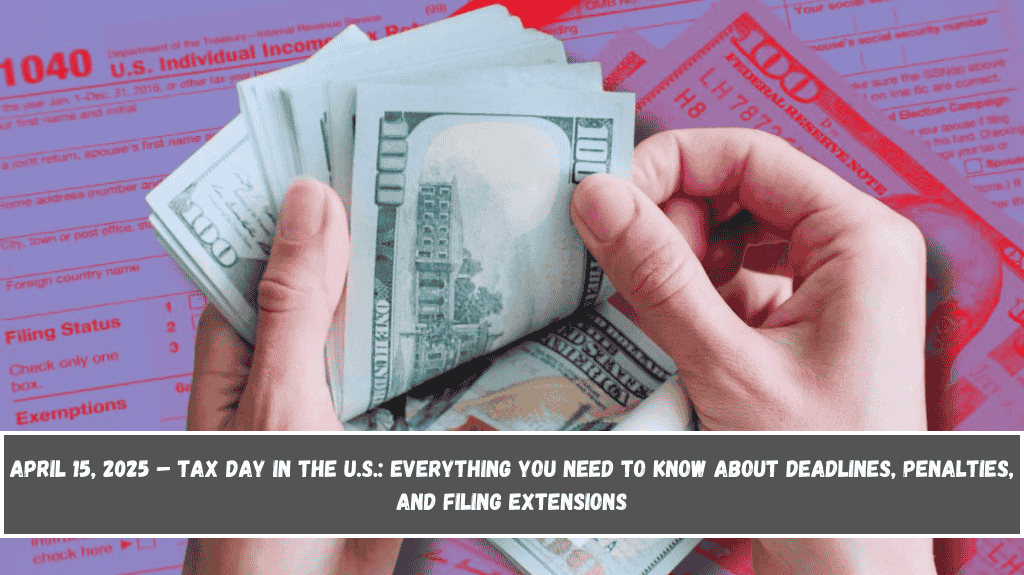In the United States, April 15, 2025, is what most people call “Tax Day” – the final date to file your federal tax return for the 2024 tax year. Whether you’re expecting a refund or owe taxes, the Internal Revenue Service (IRS) has made it clear: there are no changes to this deadline.
Let’s look at what Tax Day means, who needs to act, what happens if you file late, and how to avoid costly mistakes.
What Is Tax Day and Why Is April 15 Important?
Tax Day is the official deadline for most U.S. taxpayers to submit their income tax returns. This applies to anyone who earned income in 2024 and needs to report it to the IRS. This year, April 15 falls on a Tuesday, and since there are no holidays or exceptions, the date stands firm.
All documents, such as W-2s (for employees) or 1099s (for freelancers or contract workers), must be ready before this date. You can file online or by sending a paper return by mail.
What Happens If You Miss the April 15 Deadline?
If you owe taxes and don’t file by April 15, you could face penalties:
- Late filing penalty: 5% of your unpaid taxes per month, up to 25% total.
- Late payment penalty: 0.5% per month on the unpaid balance, also capped at 25%.
- On top of that, daily interest starts adding up from April 15 until your full payment is made.
Even if you can’t pay the full amount, the IRS recommends paying as much as you can. You can also apply for payment plans to manage your dues.

What If You’re Expecting a Refund?
Even if you expect a tax refund, you still need to file your return on time. If you don’t, the IRS won’t process your refund.
If you wait too long—more than 3 years—the IRS may file a return for you (called a Substitute for Return or SFR). These ignore deductions or credits and often result in a higher tax bill.
Can You Get a Filing Extension?
Yes. If you need more time to file, you can submit Form 4868 to get an extension until October 15, 2025. But remember:
- This extension only gives you more time to file, not more time to pay.
- You still must pay any owed taxes by April 15 to avoid penalties and interest.
People living in federal disaster areas may get special extensions, but these don’t apply to everyone.
Preparing for Tax Filing: Tips for a Smooth Process
To make sure your tax filing goes smoothly:
- Check your address with the IRS, especially if you expect a paper check refund.
- Collect all necessary documents: income statements, donation slips, proof of expenses, etc.
- Consider using tax software like TaxAct, H&R Block, or the IRS Free File program (for incomes below $73,000).
If your taxes involve foreign income, real estate sales, or business deductions, it’s better to consult a tax professional.
Avoid Common Mistakes When Filing
The IRS says many delays are caused by:
- Wrong bank account or routing numbers
- Missing income from side jobs (1099 forms)
- Typos in Social Security Numbers or income details
Before you submit your return, triple-check all information. A small error can delay your refund or lead to extra scrutiny.
IRS Uses Automation to Speed Up Reviews
In 2025, the IRS is continuing to use automated systems to check returns. This helps them catch mismatches between your tax return and what employers or banks report.
In 2023 alone, $688 million in tax fraud was detected using these tools. To stay safe, make sure your W-2 and 1099 forms match what your employer or financial institutions sent to the IRS.
April 15, 2025, is the last day to file your 2024 tax return without facing penalties or interest. Whether you’re getting a refund or owe taxes, it’s important to submit your return on time. If you need more time to prepare, you can request an extension—but any money you owe must still be paid by April 15.
Gather your documents early, use reliable software or professional help, and double-check everything before submitting. Filing late can cost you money, but filing right can help you get your refund faster.


















Leave a Reply